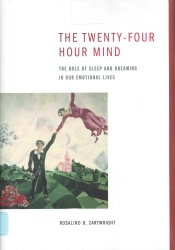
The Twenty-four Hour Mind:
The Role of Sleep and Dreaming in our Emotional Lives
by Rosalind Cartwright
RA786 .C37 2010
New Book Island, 2nd floor
I must confess: I love sleep. I can’t help it. There’s just something about getting horizontal and closing my eyes for extended periods of time that energizes me. I don’t understand how people can only sleep three or four hours a night and still function. Well, it just so happens that sleep scientists continue to make breakthroughs on just how important sleep and dreaming are to humans, with this week’s featured title no exception.
Cartwright, Professor Emeritus at Rush University Medical Center’s Graduate College Neuroscience Division, thinks pretty highly of sleep [my kind of person]. In Twenty-four Hour Mind, the author examines the impact of closing one’s eyes on their emotional well-being. The cutting-edge technological advancements in neuroscience have allowed scientists to determine the brain’s continued activity after you’re off in a dream world. This research also shows that sleep acts as a way of processing the previous day’s happenings, which has implications should a person not get a good night’s rest. Cartwright gives the reader insight into sleep science, its history and future potential in explaining the role of sleep in our lives.
